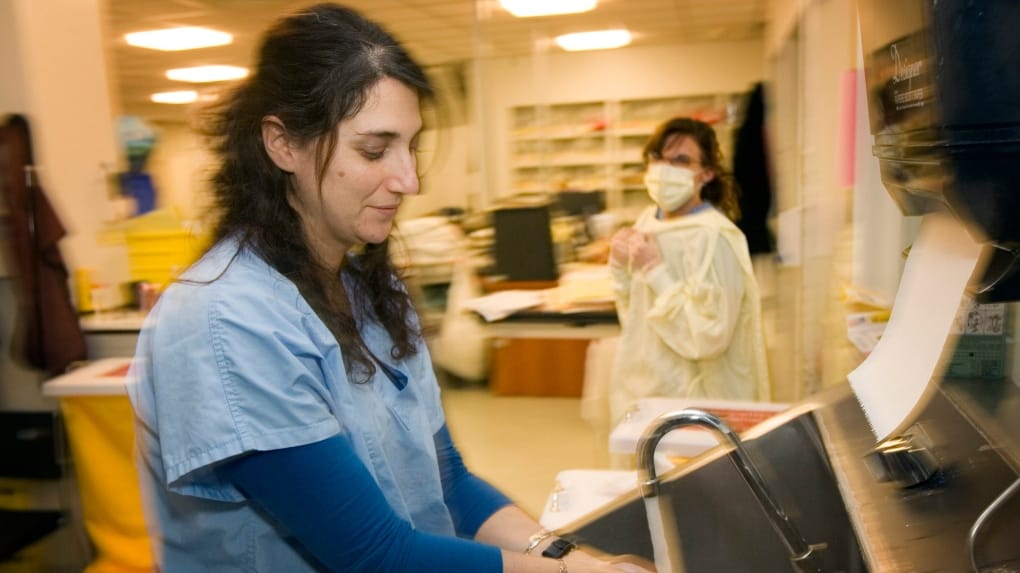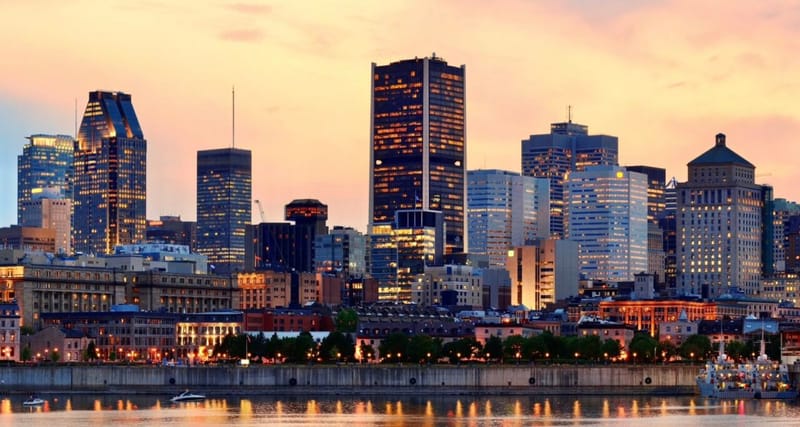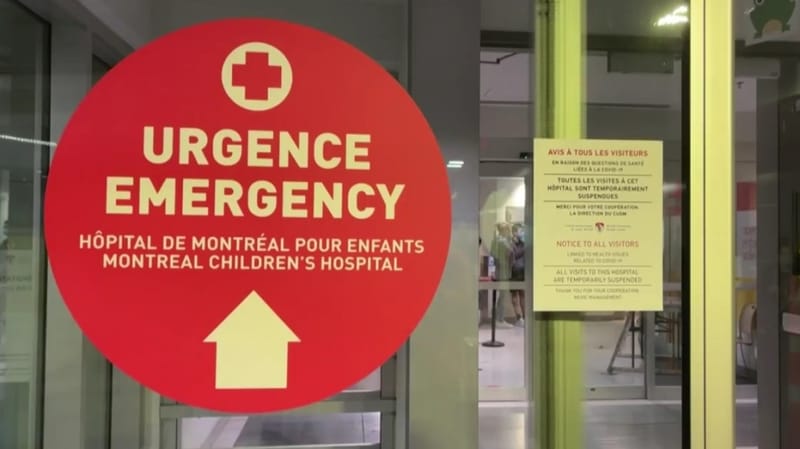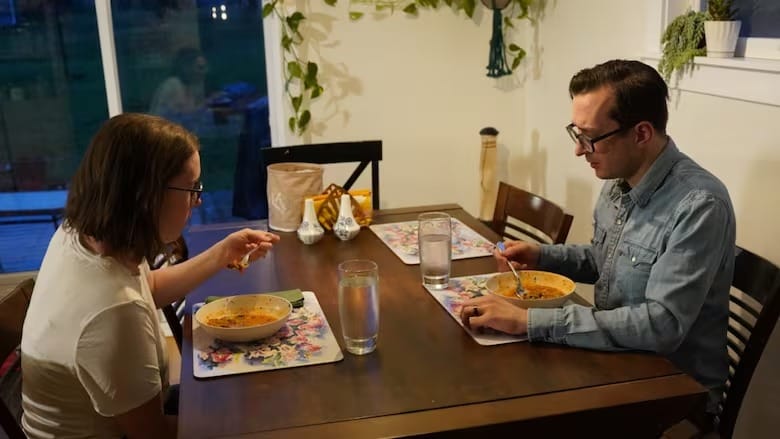What is Christmas like for Quebec health-care workers who stay on the job?
Employee potlucks seem to be a tradition at many hospitals.

Most Quebecers get together with family and friends on Christmas Eve, but many professions require people to remain on the job at all times, including health-care workers.
From emergency services to ambulances and the various hospital departments, the festive atmosphere still manages to creep into the work shifts.
“The atmosphere is really pleasant. Many paramedics and employees are wearing Christmas hats. A lot of them decorate the front of the ambulances with garlands and lights, so it brings a really festive atmosphere to the day,” said Urgences-Sante ambulance driver Adrianne Venne in Montreal.
Inside hospitals, there are a few small decorations, but not everything is allowed because of infection prevention.
But that's not the most important thing, according to Audrey-Anne Turcotte Brousseau, CIUSSS de l'Estrie – CHUS department head. She is an emergency physician at Fleurimont and Hôtel-Dieu hospitals.
“The festive atmosphere is more about people's attitude and the fact that we're all in the same boat to spend Christmas together,” said Brousseau. “It's more in people's hearts and how we interact with each other that makes it a holiday atmosphere that's different from a standard shift.”
Employee potlucks seem to be a tradition at many hospitals.
Both at Christmas and on New Year's Day, staff are invited to bring a dish and share it with their colleagues at break time.
Fares Massaad is a clinical nurse at Sainte-Justine Hospital in Montreal. He previously worked in the haemato-oncology department and is now in the emergency department.
“With the staff, the atmosphere is often more festive, both in haemato-oncology and in emergency. We order food on the 24th and have a potluck on the 25th. That's the tradition in emergency if you're working at Christmas. In haematology it was the same thing, we'd have a potluck on the 24th and 25th,” he said.
The custom is similar in the Eastern Townships, as Brousseau explains.
“From the point of view of the working atmosphere, the employees and doctors get together a little beforehand to find out who's working on the 24th and 25th in the evening and at night. Then we usually organise a little potluck or a collaborative meal to add a little festive touch to this shift when we're away from our families,” said Brousseau. “It's a shift that, despite being away from our loved ones, ends up being super enjoyable, and the patients are so grateful that we're there. There's a very special spirit that evening.”
The paramedics are also celebrating as best they can.
Venne explained that the ambulance drivers organize to meet in a hospital parking lot and on a street corner to eat together.
“Everyone brings a dish from home and shares it with the others. Chocolate fondue and non-alcoholic apple cider are quite popular,” said Venne.
Traffic is different on New Year's Day
Hospital staff also celebrate the arrival of the New Year.
“On the 31st, often during the countdown, the nurses will stay on in the department. We finish our shifts at around 11:30 p.m., so instead of everyone going home and celebrating in the metro on their own, we often stay in the department and do the count with our night colleagues,” said Massaad.
Brousseau agrees.
“Usually around midnight, unless a very unstable patient arrives, we take a few minutes to say Happy New Year to each other, and then we go back to work,” she said.
For the ambulance drivers, the situation seems a little different.
“New Year's Eve is really the opposite of Christmas. At Christmas it's pretty quiet and on New Year's Day it's really... a mess,” laughed Venne. “Before midnight it's relatively OK, but when New Year's arrives there's a lot of intoxication.”
Generally speaking, it's true that traffic is higher in the New Year’s than at Christmas.
“On the 22nd, 23rd, 24th and 25th [December], people try to stay with their families and [endure] their problems for a while. What we see afterwards is a resurgence in the number of patients who have sometimes delayed a little before coming to see us, trying to stretch things out so that they don't have to spend Christmas in hospital. We see this type of patient between Christmas and New Year's Day,” said Brousseau.
“And also due to the fact that families get together, get closer, hug each other... it's the sharing of viruses. So, a little later in the festive season, around New Year's Day, we see infectious diseases, flu, runny noses, fevers that have been going on for a few days. This is one of the reasons why New Year's Day is so busy.”
Massaad pointed out that it's a time for everyone to get together, even those who don't celebrate Christmas because of the school holidays.
“Viruses are easily transmitted in this kind of context, so we'll often see a small upsurge in respiratory viruses and contagious diseases in the days that follow,” said the nurse.
On the other hand, although the weather has an influence all year round on the number of people visiting emergency departments, a higher proportion of people travel on the roads during the festive season, which increases the risk of accidents.
“It certainly increases the number of calls considerably. Lots of falls on the ice, people falling, lots of car accidents,” said Venne.
Brousseau pointed out that during major snowstorms, emergency room traffic is often reduced for this reason.
“We see a modulation of the clientele according to the weather on a fairly daily basis,” she said.
Gratitude
Most of the staff in the health-care network sacrifice a moment of meeting time, but they feel a sense of gratitude from patients.
Massaad said he sometimes receives a small gift or chocolates in the haemato-oncology department.
“Even in the emergency department, even though patients are not followed up over the long term, the staff are very grateful to be there, whether it's Christmas Eve or New Year's Day,” he said.
Venne also feels that she is helping to break down isolation.
She said that many people call 9-1-1 because they are sad. Mixed with alcohol or other substances, they can have dark thoughts.
“I understand that it's not a life-threatening emergency, but these are still people who need emotional support,” said the ambulance driver.
She makes it her duty to treat them with empathy while they're going through a difficult time.





